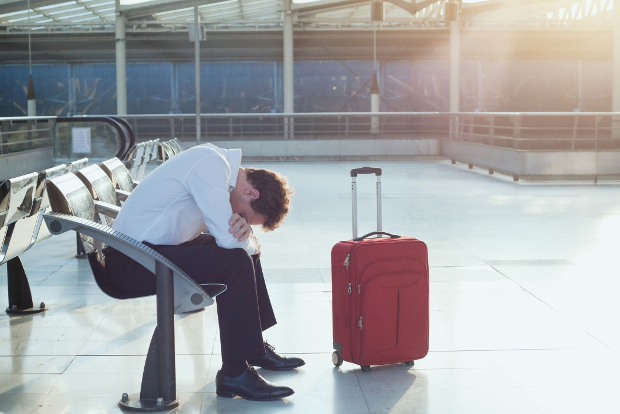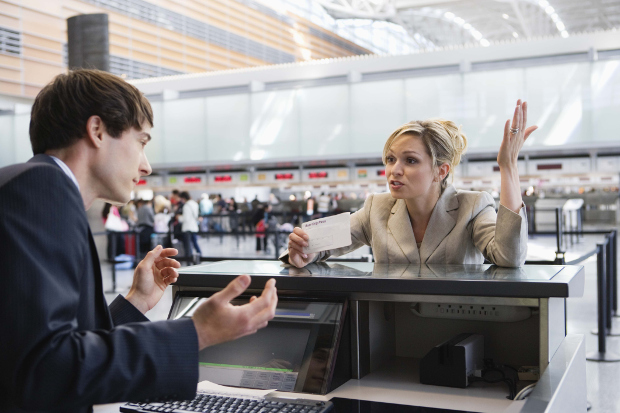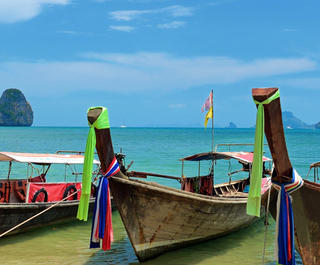According to the Australian Government, about 1.6 percent of all Australian flights in 2015 (domestic and international) were cancelled.
That means even if you book early, pack a week before and arrive at the airport during sunrise for a 6pm flight, you might still be left grounded.
Most cancelled flights are due to natural disasters. While your local Scouts might offer the mantra 'Be Prepared', how can you possibly handle such an unexpected inconvenience?
Here's a step-by-step guide to managing what's hopefully your last cancelled flight.

Don't wallow in sadness. Act quickly to rescue your travel plans and wallet (Image: Getty)
Step 1: Approach Your Airline's Information Desk
There's no need to dilly-dally. The flight has been cancelled, so your next move should be checking what exactly is going on and how you can fly as soon as possible. Move quickly; there's an entire plane's worth of concerned travellers right behind you.
Once you've found someone from the airline it's time to sort out the crucial details: why now, when can you fly and how much is this going to cost.
In a fair world the third question would be answered with: "Absolutely nothing sir/miss. We're happy to cover everything, even the cab you took to be here on time when we couldn't."
However, most Australian airlines are unwilling to offer compensation beyond the first flight, unless the cancellation was avoidable. This means cancellations due to weather (the most common cause) usually result in more headaches than refunds. However, not if you have travel insurance (more on that later).

Remember to keep your cool and be polite. Anger will only exasperate the situation (Image: Getty)
Step 2: Book An Alternative Flight
No doubt your business trip is already packed with meetings and presentations, so unless the world is burning, you're going to need a new flight.
Australia's four major airlines – Qantas, Virgin, Jetstar and Tiger – should all offer to rebook you on the next available flight according to their written statements of commitment.
A refund may also be available:
Airline's Fault
- Qantas - Full refund
- Virgin - Credit account to be spent within 12 months
- Tiger - Credit account to be spent within six months, or full refund
- Jetstar - No refund (entitled to $50 voucher if they don't re-book your flight)
Unavoidable Issues
- Qantas - Full refund
- Virgin - Credit account to be spent within 12 months
- Tiger - Credit account to be spent within six months
- Jetstar - No refund (entitled to $50 voucher if they don't re-book your flight)
Trapped in the airport? Maybe not ... 5 Airports That Offer Layover Tours
It's the little things ... Small Wins For The Business Traveller
Step 3: What About My Connecting Flight?
This is one of the first questions for international travellers, especially if one flight cancellation means missing the next one.
The first airline is more likely to help you re-book the connecting flight (often at no extra cost) if they have a codeshare agreement with the second airline.
If not, there's a good chance you'll be forking out the cash for a new flight. Unless you've booked with a travel consultant.
These trained travel experts are adept at rolling with the punches. Your consultant can organise new flights while working with your travel insurance provider (if you have one) to secure compensation.

Your travel agent can make life a lot easier when a flight is cancelled
Alternatively, the Montreal Convention can protect customers from unjust expenses, but only if you're flying between two signatory countries (this includes the USA, United Kingdom, Singapore, Japan and 115 other countries). However, if airlines are able to prove they did everything in their power to prevent your losses, they can avoid offering compensation.
This "labrynth" of a system, as aviation law expert for Shine Lawyers, Thomas Janson calls it, can cause trouble for many travellers.
He recommends informing the airline of your damages as soon as possible and always with the necessary documentation. If the airline rejects your claim, the next step is legal action or to make a complaint with the Airline Customer Advocate.
Step 4: What If I Need To Wait Overnight?
Aside from Australia's low cost carriers (Tiger and Jetstar), our airlines are quite happy to provide adequate living arrangements for long delays. But only when they are at fault.
Both Virgin and Qantas will cover reasonable accommodation costs, airport transfers and meals (up to $50 per person per night for Virgin, while Qantas organises the food). "Reasonable costs" don't include a midnight mini-bar raid.
However, in the case of an unavoidable delay the most you can expect is help sourcing accommodation and transfers. Unfortunately, bad weather and natural disasters are usually when you'll need overnight arrangements.
This is another scenario where travel insurance can save you hundreds of dollars in hotel, food and transport costs. It's always best to be safe, so treat the old motto as gospel: "If you can't afford travel insurance, you can't afford to travel."

You'll enjoy the hotel a lot more if it's covered by the airline or travel insurance and not your wallet (Image: Getty)
Step 5: Settle In
Whether you're heading to your hotel room or spending the next three hours in a departure lounge, it's best to accept life's curveball and make the most of this extra time.
First, make sure everyone who needs to know understands the situation. Once that's done, you can use the time to catch-up on work, relax with some reading or numb your stress with a few cocktails.
Keep in mind that FCBT provides 24/7 support to help you through any travel situation you may run into. That means no matter where you are in the world, what time it is or what day of the week, you can contact us for assistance. For more information on this or other ways FCBT can help you streamline your business travel strategy, call us on 1300 797 826.









